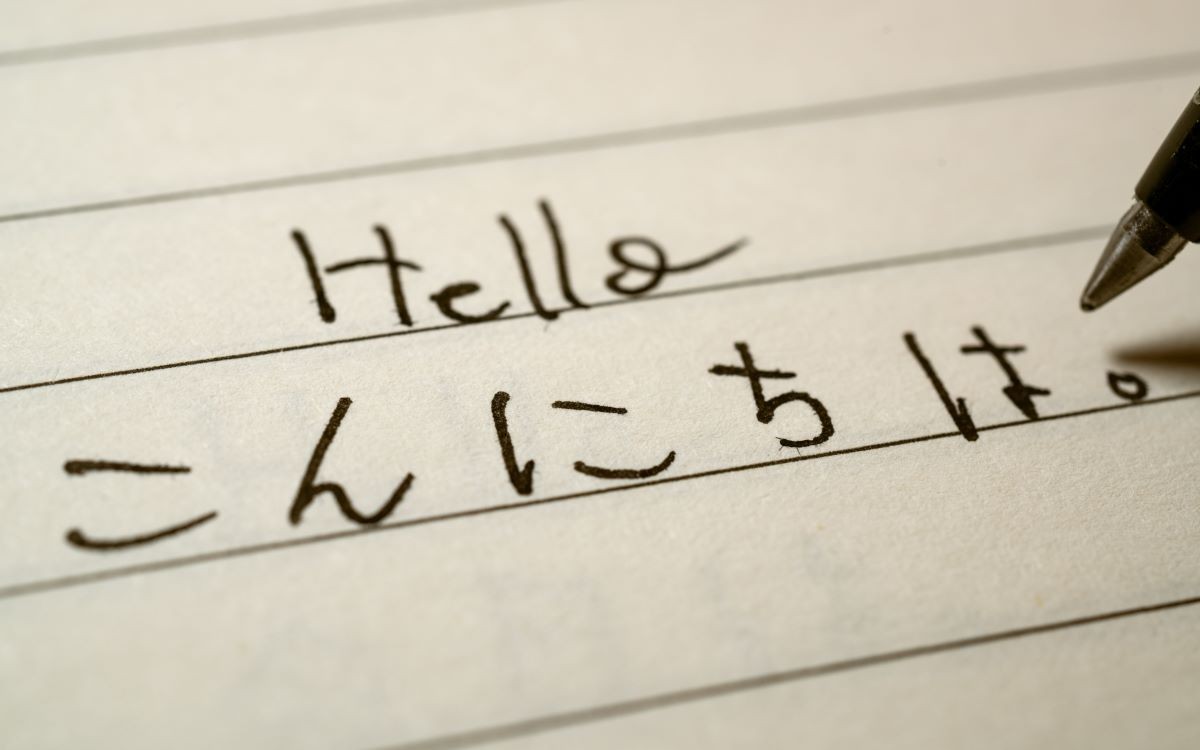What Does "Konnichiwa" Mean? A Guide to Saying Hello in Japanese

"こんにちは (Konnichiwa)" is one of the most common greetings in Japan. While it's typically used in the afternoon, the time of usage can vary even among Japanese people. Moreover, how and when you use it depends on the situation or the person you’re speaking to, and sometimes alternative phrases may be more appropriate. This article explains the meaning of "Konnichiwa," how to use it correctly, how to respond, and includes some example conversations.
What Does "Konnichiwa" Mean?
"Konnichiwa" is a greeting used during the day, particularly in the afternoon. It originates from a longer phrase, such as "Konnichiwa, gokigen ikaga desu ka?" meaning "How are you today?" Over time, the latter part of the phrase was omitted for simplicity. The phrase became widely used during the Meiji era (1868–1912) when it was introduced in school textbooks.
When to Use "Konnichiwa"

1. Greeting neighbors or acquaintances in the afternoon
One common use of "Konnichiwa" is when you meet neighbors or acquaintances for the first time that day. These interactions might lead to a brief chat or simply end with the greeting. "Konnichiwa" tends to sound slightly formal, so it’s often used for people you’re less familiar with rather than close friends or family. For those you’re very close to, using "Konnichiwa" can come across as too distant or formal, and other greetings are usually exchanged instead.
2. Visiting friends’ or relatives’ homes
When visiting a friend or relative’s home during the day, it's common to greet their family members or elders with "Konnichiwa." However, just like when meeting outside, "Konnichiwa" might feel too formal when talking to close friends or relatives of a similar age. In such cases, people often opt for less formal greetings. That said, some people still use "Konnichiwa" with close friends. If you're unsure, it's best to follow their lead—if they say "Konnichiwa," you can respond with "Konnichiwa" as well.
How Do You Differentiate Between "Ohayou" and "Konnichiwa"?

The main difference between "Ohayou" and "Konnichiwa" lies in the time of day they are used. Generally, "Ohayou" is used in the morning, while "Konnichiwa" is the standard greeting for the afternoon. However, some Japanese people start using "Konnichiwa" as early as around 10 a.m., so "Ohayou" isn’t strictly limited to the morning. Similarly, while "Konnichiwa" is commonly used until sunset, it’s not unusual for people to use it later in the evening, and most won’t mind. This flexibility makes "Konnichiwa" a convenient greeting to use when you’re unsure of the appropriate phrase.
How Do You Write "Konnichiwa" in Hiragana?
In Japanese, "Konnichiwa" is written as "こんにちは" in hiragana. One thing to note is the final character, "は" (ha).
Although the word is pronounced as "Konnichiwa," the character "は" is pronounced as "wa" in this context. Normally, "は" is read as "ha" when it stands alone, so it might seem natural to write and pronounce it as "Konnichiha." However, in greetings, this "は" serves as a particle and is pronounced as "wa."
That said, you might come across people writing it as "こんにちわ (wa)," which is technically incorrect but not uncommon. If you want to stick to the proper way of writing it, remember that "こんにちは" is the correct spelling.
How Do You Write "Konnichiwa" in Kanji?
In Japanese, "Konnichiwa" can be written in kanji as "今日は." However, it is now more common to write it in hiragana as "こんにちは." The kanji form is rarely used in everyday greetings today.
How to Respond to "Konnichiwa"

When someone greets you with "Konnichiwa," the usual response is to simply say "Konnichiwa" back. However, in formal situations, such as when speaking to a business associate or a superior, adding a polite phrase that shows consideration or gratitude can make a better impression.
| Japanese | Romaji | Meaning |
| いつもお世話になっております | Itsumo osewa ni natte orimasu | A phrase often used in Japanese business settings to express gratitude for ongoing support. |
| ご無沙汰しております | Gobusata shite orimasu | A phrase used to greet someone you haven’t seen in a while. |
Other Ways to Say "Konnichiwa"
When greeting someone, adding a phrase along with "Konnichiwa" can not only leave a polite impression but also serve as an effective conversation starter. For situations where you're greeting a boss, a senior colleague, or an acquaintance, consider using one of the phrases below:
| Japanese | Romaji | Meaning |
| こんにちは、お元気ですか? | Konnichiwa, Ogenki desuka? | A classic greeting phrase asking "How are you?" |
| こんにちは、いい天気ですね | Konnichiwa, Ii tenki desune | Used on nice weather days to comment on the weather. |
| こんにちは、先日はありがとうございました | Konnichiwa, Senjitsu ha arigatou gozaimashita | A phrase to express thanks for something that happened previously. |
| こんにちは、寒いですね | Konnichiwa, Samui desune | A phrase used on cold days to acknowledge the weather. |
Afternoon Greetings Other Than "Konnichiwa"
While "Konnichiwa" is a versatile greeting that can be used from around 10 a.m. to the evening, it may feel too formal or awkward to use with close friends, colleagues, or in certain work environments. Here are alternative phrases often used depending on the situation:
Polite Greetings for Superiors or Formal Settings
お疲れ様です/Otsukaresama Desu
A common phrase for greeting superiors or senior colleagues at work.
おはようございます / Ohayo Gozaimasu
In workplaces with staggered shifts, this phrase is often used regardless of the time of day.
Casual Greetings for Friends or Colleagues
おつかれー / Otsukare
A casual version of "Otsukaresama Desu," used among friends or coworkers.
おはよう / Ohayo
While traditionally a morning greeting, it can also be used casually among close friends instead of "Konnichiwa."
どうも / Doumo
A less formal alternative to "Konnichiwa." This versatile phrase can be used in various situations, such as when greeting a neighbor or meeting someone for the first time.
Regional Variations of "Konnichiwa"
Japan is home to many regional dialects, and "Konnichiwa" is commonly used in over 30 of the country’s 47 prefectures. However, unique greetings specific to each region have also developed over time. Here are some notable examples of daytime greetings in various local dialects:
Yamagata Prefecture: こんにぢは / Konnijiwa
- Fukushima Prefecture: どうもない / Doumonai
- Niigata Prefecture (Tokamachi City, Minamiuonuma City, etc.): だんだんどうも / Dandan Doumo
- Toyama Prefecture: まいどはや / Maidohaya
- Ishikawa Prefecture: まいどさん / Maidosan
- Nagano Prefecture (Ina City, Iida City, etc.): こらしゃん / Korashan
- Wakayama Prefecture: こんちわー / Konchiwa
- Tottori Prefecture: こんちは / Konchiwa
- Kagoshima Prefecture: ちゃした / Chashita
- Okinawa Prefecture: はいさい / Haisai
Example Conversations Using "Konnichiwa"
Here are some practical examples of how to use "Konnichiwa" in everyday situations. Try them out during your trip to Japan!
(1) At a hotel, handing over your room key
A: "こんにちは、鍵をお願いします。" (Konnichiwa, Kagi wo onegai shimasu)
B: "かしこまりました。" (Kashikomarimashita)
(2) Asking for the price of an item at a store
A: "こんにちは。" (Konnichiwa)
B: いらっしゃいませ。" (Irasshaimase)
A: "これはいくらですか?" (Kore wa ikura desuka?)
B: "はい、1,000円です。" (Hai, Sen en desu)
Index
- What Does "Konnichiwa" Mean?
- When to Use "Konnichiwa"
- How Do You Differentiate Between "Ohayou" and "Konnichiwa"?
- How Do You Write "Konnichiwa" in Hiragana?
- How Do You Write "Konnichiwa" in Kanji?
- How to Respond to "Konnichiwa"
- Other Ways to Say "Konnichiwa"
- Afternoon Greetings Other Than "Konnichiwa"
- Regional Variations of "Konnichiwa"
- Example Conversations Using "Konnichiwa"
